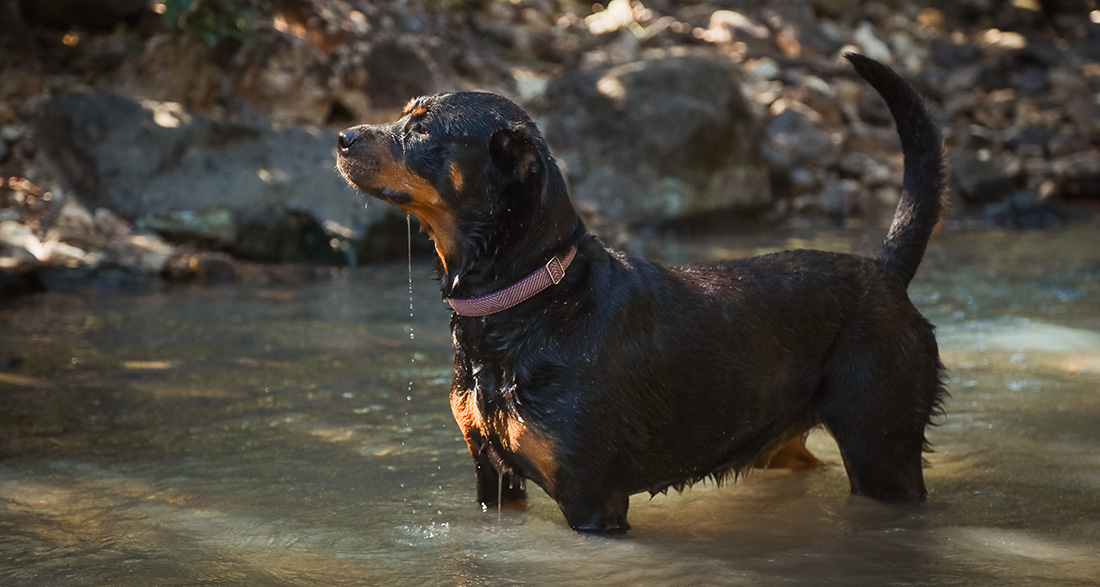Dirty dogs are happy dogs – when they come back wet and shaggy from playing, the enthusiasm of the four-legged friends is usually great. However, pet owners often wrinkle their noses due to the stinky fur. But why do wet dogs smell?
While the natural scent of dry dogs is generally tolerable, wet dogs emit a rather distinctive odor. Those returning home with their dogs after a walk in the rain and closing the front door quickly catch a whiff of a musty smell.
The causes are dirt, dead skin cells, hormones, but above all, the dog’s own scent. These are produced by microorganisms – tiny living beings, including bacteria, yeasts, and fungi, which are also responsible for the sweetish scent of dog paws that some liken to popcorn.
Microorganisms determine the doggy odor
Body warmth and limited air exchange in the fur create ideal conditions for such microorganisms. Particularly, large dogs with long and dense fur spread a strong odor more quickly than dogs with short fur. The organic particles can cling well to the coat.
Even though these bacteria and yeasts continually enrich the dog’s fur through their excretions, we humans hardly notice the resulting smells – at least, as long as the fur is dry. However, when the dog’s fur becomes wet, body warmth causes the water in its fur to evaporate.
In this process, the water releases odor molecules from the tiny excrements in the dog’s fur and carries them into the air. As the water evaporates, a musty mist is released, carrying a high concentration of odor molecules. This scent cloud then reaches our noses through the air.
The principle is similar to the forest soil: As long as the ground is dry, it hardly has a scent. However, when it starts raining and the forest soil becomes wet, we suddenly perceive the typical earthy forest smell while walking through the underbrush.
What to do about the smell of a wet dog?
Fortunately, the unpleasant odor of a dog with wet fur can usually be quickly eliminated by thoroughly drying it with a large towel. The rest takes care of itself, and after some time, the smell should dissipate. If the dog allows it, a hairdryer can also help speed up the drying process.
If the smell is unbearable, giving the dog a bath and thoroughly cleaning the fur with dog shampoo is recommended. This reduces the number of microorganisms and, consequently, the odor-producing substances in the fur. To avoid destroying the natural protective film of the dog’s skin, the animal should be washed as infrequently as possible and only as often as necessary.
Because a dog smells when wet is entirely natural and indicates that its skin produces sebum, acting as a kind of protective shield in damp conditions to protect the animal. Bathing a dog too frequently destroys this natural protective film of the skin.
By the way: The process is quite similar with human hair. When our hair becomes greasy, it is also due to sebum. If someone doesn’t wash their hair for an extended period, they will probably smell similar to a wet poodle after a rain shower.
Dog Odor and Skin Infections
Skin infections are a common issue for many dogs. Although allergies or other skin problems usually trigger infections, they can be exacerbated by frequent swimming, particularly if the coat takes a while to fully dry. While dogs can shake off a significant amount of water after getting wet, this may not be sufficient for breeds with water-resistant or dense coats. Dogs with skin folds are susceptible to infections in these folds where adequate air circulation is hindered, preventing the skin from drying properly.
The smell associated with a skin infection is generally more intense than the typical “wet dog” odor and often carries a sour and foul aroma. Recognizing a sour smell could be the initial indication of a skin infection. A thorough examination of the fur may reveal bumps, sores, boils, or rashes, which can manifest anywhere on the skin. The skin might appear red, flaky, or excessively greasy, and you may notice a greasy or waxy coating. Many skin infections also induce itchiness in dogs.
If you suspect a skin infection in your dog, it’s crucial to consult your vet for guidance. Depending on the severity, your dog might require medical intervention in the form of antibiotics or antifungals. Your vet might also suggest applying a topical medication and/or bathing your dog with a medicated shampoo.
In cases where medication is not deemed necessary by your vet, you may consider using over-the-counter products to alleviate your dog’s skin discomfort. Bathing your dog with over-the-counter dog shampoo can often help with skin itching and irritation, with oatmeal-based shampoos being a particularly good choice. Always consult your veterinarian before trying any natural products on your dog.
For dogs prone to skin infections, inquire with your vet about nutritional supplements and specialized diets that can help prevent recurrence.


